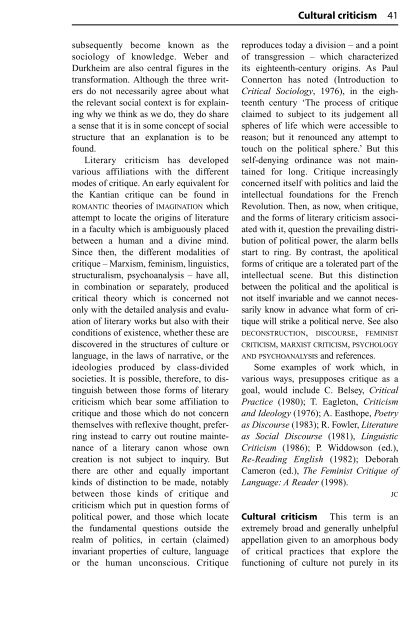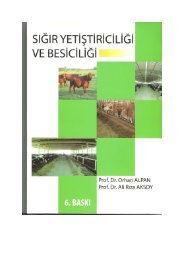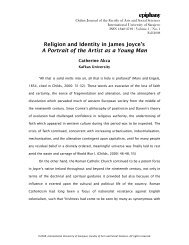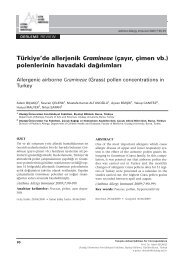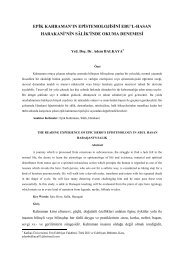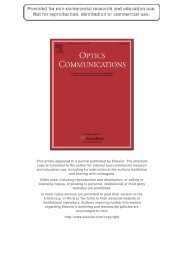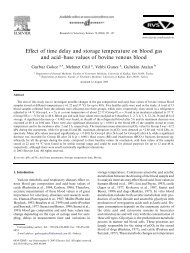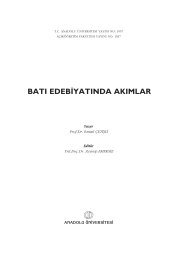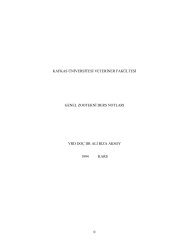The Routledge Dictionary of Literary Terms
The Routledge Dictionary of Literary Terms
The Routledge Dictionary of Literary Terms
You also want an ePaper? Increase the reach of your titles
YUMPU automatically turns print PDFs into web optimized ePapers that Google loves.
subsequently become known as the<br />
sociology <strong>of</strong> knowledge. Weber and<br />
Durkheim are also central figures in the<br />
transformation. Although the three writers<br />
do not necessarily agree about what<br />
the relevant social context is for explaining<br />
why we think as we do, they do share<br />
a sense that it is in some concept <strong>of</strong> social<br />
structure that an explanation is to be<br />
found.<br />
<strong>Literary</strong> criticism has developed<br />
various affiliations with the different<br />
modes <strong>of</strong> critique. An early equivalent for<br />
the Kantian critique can be found in<br />
ROMANTIC theories <strong>of</strong> IMAGINATION which<br />
attempt to locate the origins <strong>of</strong> literature<br />
in a faculty which is ambiguously placed<br />
between a human and a divine mind.<br />
Since then, the different modalities <strong>of</strong><br />
critique – Marxism, feminism, linguistics,<br />
structuralism, psychoanalysis – have all,<br />
in combination or separately, produced<br />
critical theory which is concerned not<br />
only with the detailed analysis and evaluation<br />
<strong>of</strong> literary works but also with their<br />
conditions <strong>of</strong> existence, whether these are<br />
discovered in the structures <strong>of</strong> culture or<br />
language, in the laws <strong>of</strong> narrative, or the<br />
ideologies produced by class-divided<br />
societies. It is possible, therefore, to distinguish<br />
between those forms <strong>of</strong> literary<br />
criticism which bear some affiliation to<br />
critique and those which do not concern<br />
themselves with reflexive thought, preferring<br />
instead to carry out routine maintenance<br />
<strong>of</strong> a literary canon whose own<br />
creation is not subject to inquiry. But<br />
there are other and equally important<br />
kinds <strong>of</strong> distinction to be made, notably<br />
between those kinds <strong>of</strong> critique and<br />
criticism which put in question forms <strong>of</strong><br />
political power, and those which locate<br />
the fundamental questions outside the<br />
realm <strong>of</strong> politics, in certain (claimed)<br />
invariant properties <strong>of</strong> culture, language<br />
or the human unconscious. Critique<br />
Cultural criticism 41<br />
reproduces today a division – and a point<br />
<strong>of</strong> transgression – which characterized<br />
its eighteenth-century origins. As Paul<br />
Connerton has noted (Introduction to<br />
Critical Sociology, 1976), in the eighteenth<br />
century ‘<strong>The</strong> process <strong>of</strong> critique<br />
claimed to subject to its judgement all<br />
spheres <strong>of</strong> life which were accessible to<br />
reason; but it renounced any attempt to<br />
touch on the political sphere.’ But this<br />
self-denying ordinance was not maintained<br />
for long. Critique increasingly<br />
concerned itself with politics and laid the<br />
intellectual foundations for the French<br />
Revolution. <strong>The</strong>n, as now, when critique,<br />
and the forms <strong>of</strong> literary criticism associated<br />
with it, question the prevailing distribution<br />
<strong>of</strong> political power, the alarm bells<br />
start to ring. By contrast, the apolitical<br />
forms <strong>of</strong> critique are a tolerated part <strong>of</strong> the<br />
intellectual scene. But this distinction<br />
between the political and the apolitical is<br />
not itself invariable and we cannot necessarily<br />
know in advance what form <strong>of</strong> critique<br />
will strike a political nerve. See also<br />
DECONSTRUCTION, DISCOURSE, FEMINIST<br />
CRITICISM, MARXIST CRITICISM, PSYCHOLOGY<br />
AND PSYCHOANALYSIS and references.<br />
Some examples <strong>of</strong> work which, in<br />
various ways, presupposes critique as a<br />
goal, would include C. Belsey, Critical<br />
Practice (1980); T. Eagleton, Criticism<br />
and Ideology (1976); A. Easthope, Poetry<br />
as Discourse (1983); R. Fowler, Literature<br />
as Social Discourse (1981), Linguistic<br />
Criticism (1986); P. Widdowson (ed.),<br />
Re-Reading English (1982); Deborah<br />
Cameron (ed.), <strong>The</strong> Feminist Critique <strong>of</strong><br />
Language: A Reader (1998).<br />
Cultural criticism This term is an<br />
extremely broad and generally unhelpful<br />
appellation given to an amorphous body<br />
<strong>of</strong> critical practices that explore the<br />
functioning <strong>of</strong> culture not purely in its<br />
JC


